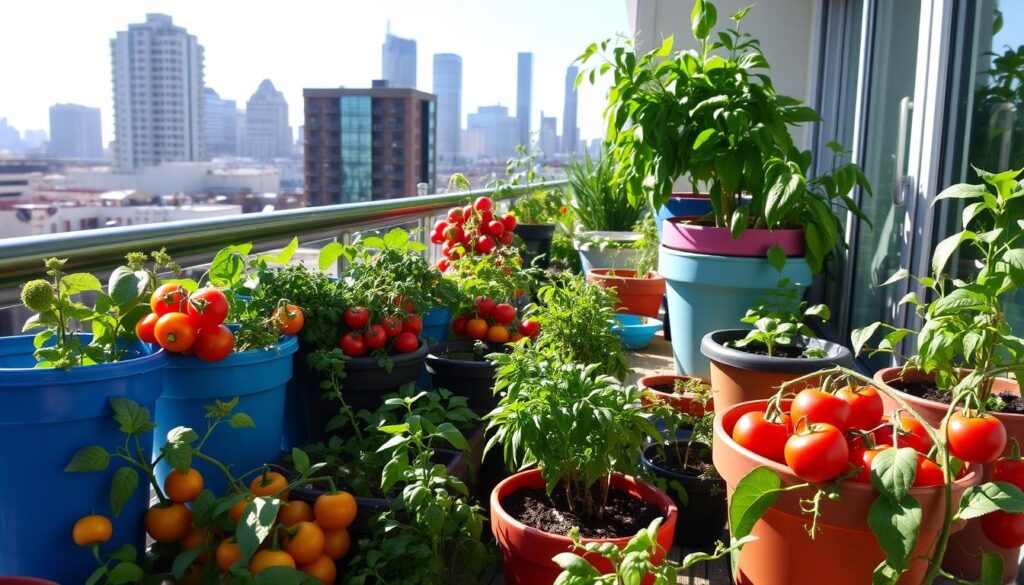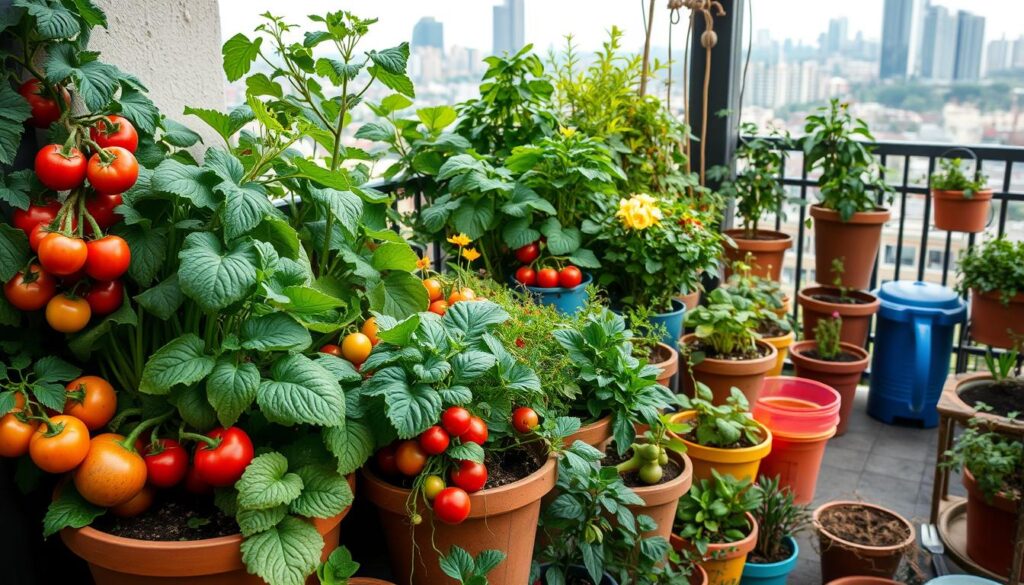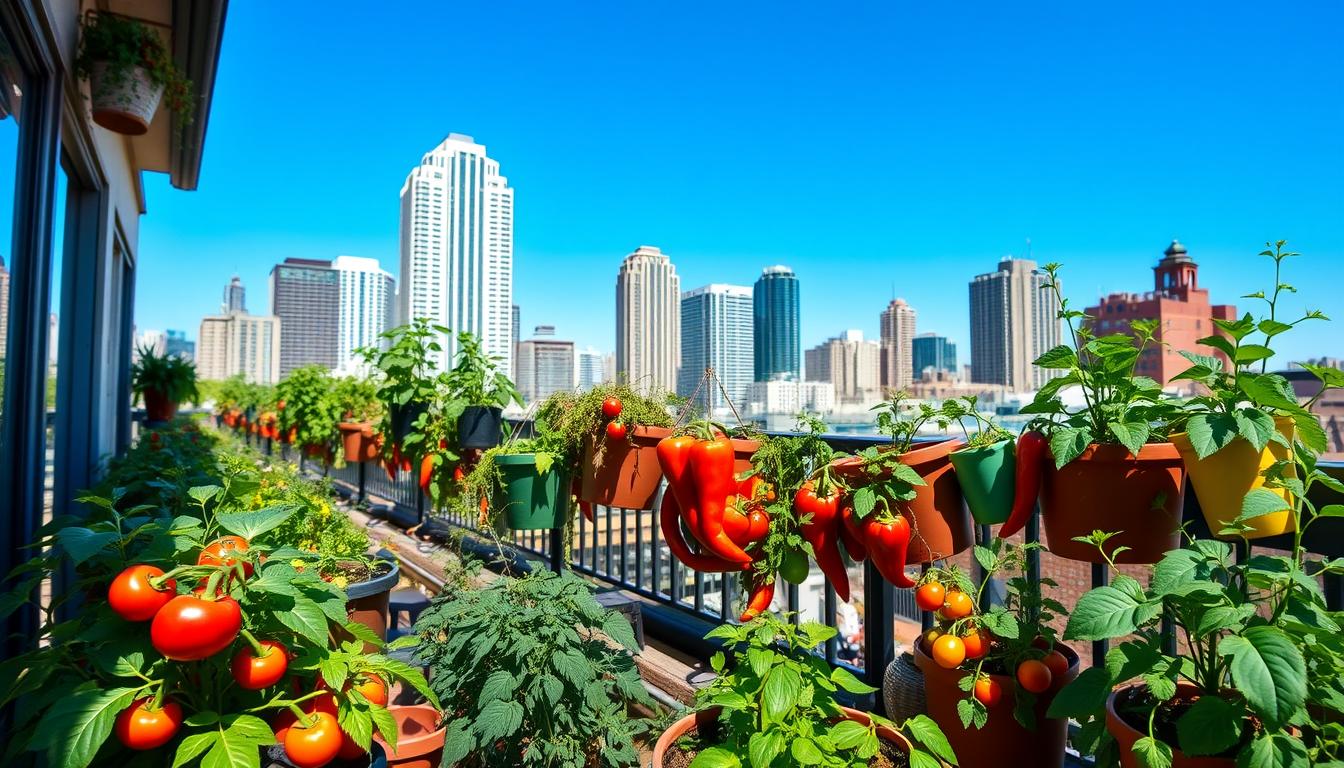Living in the city doesn’t mean you can’t grow your own food. This guide will show you how to create a garden on your balcony or rooftop. You can grow fresh, healthy food right where you live.
Urban vegetable gardening has many benefits. It lets you have fresher food and helps the planet. You can turn your small space into a green oasis. I’ll share tips on choosing the right plants, soil, and more to help you succeed.
Key Takeaways
- Discover the benefits of growing your own produce in urban settings
- Learn how to select the right containers and plants for your balcony or rooftop garden
- Understand the importance of soil quality and proper watering and fertilization techniques
- Explore organic methods for managing pests in confined urban garden spaces
- Maximize your harvests and extend the growing season through innovative design ideas
The Benefits of Urban Gardening
Urban gardening, whether on a balcony or rooftop, brings many benefits. Growing your own food means you get to enjoy fresh, nutritious veggies right at home. This not only gives you a steady supply of urban gardening benefits. It also cuts down on the carbon emissions from commercial food production and transport.
Fresher Produce at Your Fingertips
Growing your own fresh produce means no long trips for your food. This keeps more of the important nutrients and flavor in your veggies. You’ll taste the difference, and it’s better than store-bought.
Reduced Carbon Footprint
Urban gardens help lower your environmental impact. They cut down on the need for long-distance food transport. This reduces carbon emissions from commercial food systems. So, you get to enjoy your garden’s harvest while helping the planet.
“Growing your own food is like printing your own money.” – Ron Finley, urban gardening activist
| Benefit | Description |
|---|---|
| Fresher Produce | Urban-grown fruits and vegetables are harvested at their peak ripeness, retaining more nutrients and flavor. |
| Reduced Carbon Footprint | Eliminating the need for long-distance transportation lowers the environmental impact of food production. |
| Sustainable Gardening | Urban gardens promote a more eco-friendly approach to food cultivation and consumption. |
Choosing the Right Containers
Choosing the right containers is key to a successful urban garden. Consider the size of your plants, the space you have, and how much weight your balcony or rooftop can hold. I’ll guide you on picking the best container gardening options for small spaces and how to make the most of your area.
Size is important in container gardening. Pick containers that match the size of your plants when they’re fully grown. Tomatoes and pole beans need deeper pots, while leafy greens and herbs do well in shallower ones. Choose durable, weather-resistant materials like ceramic, resin, or even old items like wooden crates or five-gallon buckets.
For small balcony gardens or rooftop gardens, use vertical gardening to save space. Tiered planters, hanging baskets, and wall-mounted systems let you grow more in less space. But remember, too many heavy containers can be a problem.
| Container Type | Recommended Use | Advantages |
|---|---|---|
| Raised Beds | Larger vegetables, herbs | Improved soil quality, easy access |
| Fabric Planters | Leafy greens, root vegetables | Lightweight, promote root growth |
| Self-Watering Pots | Herbs, tomatoes, peppers | Consistent moisture, reduced maintenance |
By picking the right urban garden containers for your space and plants, you’ll have a thriving balcony garden or rooftop garden. Think about size, weight, and what your plants need to grow well.
Growing Vegetables in Urban Spaces: Tips for Balcony and Rooftop Gardens
Urban vegetable gardening on balconies and rooftops is rewarding, even with little space. By picking the right plants and using your space wisely, you can harvest fresh produce easily. Here are some tips to help you make the most of your urban garden.
Selecting Suitable Plants
Choosing compact, high-yielding plants is key for urban gardening. Cherry tomatoes, dwarf beans, leafy greens, and compact zucchini are great choices. These plants grow well in small spaces and produce a lot of food.
Maximizing Limited Space
Space is precious in urban gardens. Use vertical gardening with trellises or hanging baskets to grow more. Mix tall, medium, and trailing plants for a beautiful and productive garden.

“The key to successful urban vegetable gardening is finding the right balance between plant selection and spatial optimization.”
By picking the right vegetables and arranging them well, you can turn your balcony or rooftop into a lush garden. It will give you a steady supply of fresh, tasty produce.
Soil Requirements for Urban Gardens
Getting the right soil is key for a healthy urban garden. Whether you’re growing veggies, herbs, or flowers, knowing the difference between potting mixes and garden soil is important. It helps you pick the best mix for your plants to grow well.
Potting Mix vs. Garden Soil
Potting mixes are made for container gardens. They have peat moss, vermiculite, and perlite. These materials help with drainage and aeration, which is vital for plants in small spaces.
Garden soil is heavier and has more nutrients. It’s better for planting directly in the ground. For urban gardens, a good potting mix is usually the best choice for container gardens. It prevents waterlogging and ensures plants get enough oxygen.
If you’re using garden soil, add compost or organic matter. This boosts nutrients and improves soil structure. It makes your urban garden soil healthier for plants.
Testing your soil regularly is important, no matter the type. It helps you keep nutrient levels right. With the right potting mix or garden soil, you can make a lush oasis in any urban space.
Watering and Fertilizing Your Urban Garden
Keeping your urban garden watered and fertilized is key to its success. Whether you’re growing veggies on your balcony or in a rooftop container, knowing what your plants need is crucial. This knowledge can help you get a great harvest.
Effective Watering Techniques for Urban Spaces
Watering in urban areas can be tricky due to space and harsh weather. Here are some tips to help your plants stay moist:
- Use a watering can with a fine-mist spray to gently water your plants, avoiding excessive water runoff.
- Consider installing a drip irrigation system, which delivers water directly to the root zone and minimizes evaporation.
- Group plants with similar watering requirements together to simplify your watering routine.
- Mulch around the base of your plants to retain soil moisture and reduce the frequency of watering.
Choosing the Right Fertilizers for Urban Gardens
It’s important to give your urban garden the right nutrients for healthy growth. Look for fertilizers that are made for container or urban gardens:
| Fertilizer Type | Benefits |
|---|---|
| Organic Compost | Enriches the soil with essential nutrients and improves water retention. |
| Slow-Release Fertilizers | Deliver a steady supply of nutrients over an extended period, reducing the need for frequent applications. |
| Liquid Fertilizers | Provide an immediate nutrient boost and are easy to apply directly to the soil or foliage. |
By using these urban garden watering and urban garden fertilizing tips, you can make your container garden watering and container garden fertilizing efforts pay off. Your urban garden will thrive and give you a great harvest.
Pest Control in Confined Spaces
Keeping an urban garden healthy, whether on a balcony or rooftop, needs good pest control. These small spaces make it hard to fight off pests. But, using organic methods can help protect your plants and the environment.
Organic Methods for Pest Management
Choosing organic pest control is key for urban gardens. These methods keep your plants safe and protect the environment. Here are some effective ways to manage pests:
- Introduce beneficial insects: Ladybugs, lacewings, and praying mantises eat pests like aphids and mites.
- Use neem oil or insecticidal soap: These plant-based products kill pests without harming the environment.
- Encourage habitat diversity: A mix of flowers, herbs, and plants attracts good bugs and balances your garden.
- Manually remove pests: For small problems, removing pests like caterpillars or slugs is safe and effective.
- Apply diatomaceous earth: This powder stops crawling pests like ants and snails.
Using these organic methods keeps your garden healthy and green. It also helps the environment. With a bit of effort, you can enjoy your garden’s fruits and a beautiful urban space.
| Pest | Organic Control Method | Benefits |
|---|---|---|
| Aphids | Introduce ladybugs or lacewings | Natural predators that feed on aphids, keeping populations in check |
| Spider mites | Use neem oil or insecticidal soap | Plant-based solutions that effectively eliminate mites without harming plants or the environment |
| Slugs and snails | Apply diatomaceous earth | A non-toxic mineral powder that deters and eliminates crawling pests |

By using these organic pest control methods, you can make your urban garden a thriving, green space. It will be in perfect harmony with the ecosystem around it.
Harvesting and Preserving Your Urban Crops
Getting the most from your urban garden is key. Learning how to harvest and preserve your crops lets you enjoy them longer. This way, you can keep enjoying fresh, homegrown food from your garden.
Extending the Growing Season
To make your garden grow longer, try these tips:
- Use row covers, cold frames, or mini greenhouses to protect plants from frost and extend the season on both ends.
- Opt for cool-weather crops like kale, spinach, and carrots that can withstand lower temperatures.
- Succession plant by sowing seeds at staggered intervals, ensuring a continuous harvest.
- Explore season-extending techniques like cold storage or root cellaring to preserve your urban garden harvesting well into the winter months.
| Crop | Ideal Harvest Time | Preservation Methods |
|---|---|---|
| Tomatoes | Summer | Canning, freezing, drying |
| Leafy Greens | Spring and Fall | Freezing, dehydrating |
| Carrots | Fall | Root cellaring, canning, freezing |
Using these urban garden preservation methods can make your garden more productive. You’ll get to enjoy your hard work for months.
“Preserving the harvest is a way to capture the season’s bounty and enjoy it year-round.”
Creative Ideas for Urban Garden Designs
Urban gardens can be more than just places to grow plants. I’ll show you how to make them look great and work well. We’ll use vertical gardening, hanging planters, and other tricks to turn your balcony or rooftop into a beautiful spot.
Vertical gardening is a great way to use space. You can hang planters on walls or use tiered shelves. This makes your garden look cool and saves floor space. It’s perfect for balcony garden design or rooftop garden design.
Hanging planters are another fun idea. You can hang them from ceilings or walls. They’re great for plants that like to spill over, like vines or flowers. They make your small space garden design look lush and green.
Think about using old things as planters. Like old watering cans or teacups. They add a unique touch to your garden and show off your creativity.
Adding decorative elements can make your garden special. Try garden sculptures, trellises, or even a small water feature. These add beauty and calm to your balcony garden design or rooftop garden design.
With these ideas, you can make your urban garden design amazing. It will show off your style and love for gardening.
Conclusion
Urban gardening lets you grow fresh food right in the city. This guide shows how to turn your balcony or rooftop into a green space. You’ll learn about choosing the right plants, dealing with pests, and growing food all year.
Urban gardening helps the planet, saves you time, and brings joy. It’s a way to live more sustainably and enjoy your own food. You’ll get to enjoy the taste of your own harvest.
Start your urban gardening adventure with an open mind. Try new things and enjoy the journey. Your garden will become a peaceful spot that feeds your body and soul. Enjoy the fresh food that will come from your garden for years.



Leave a Reply